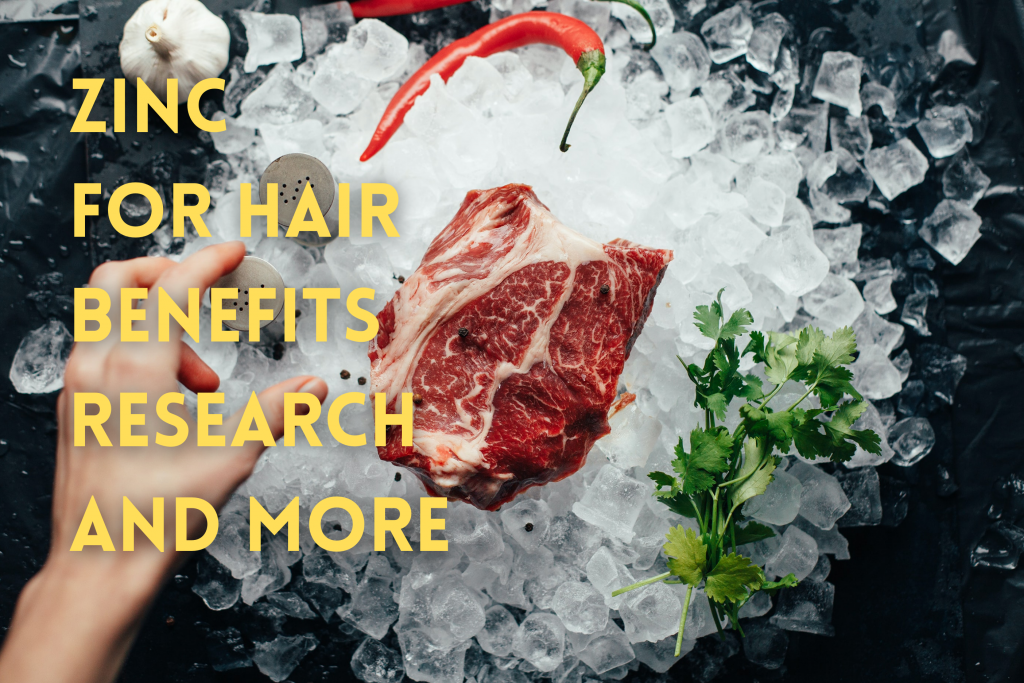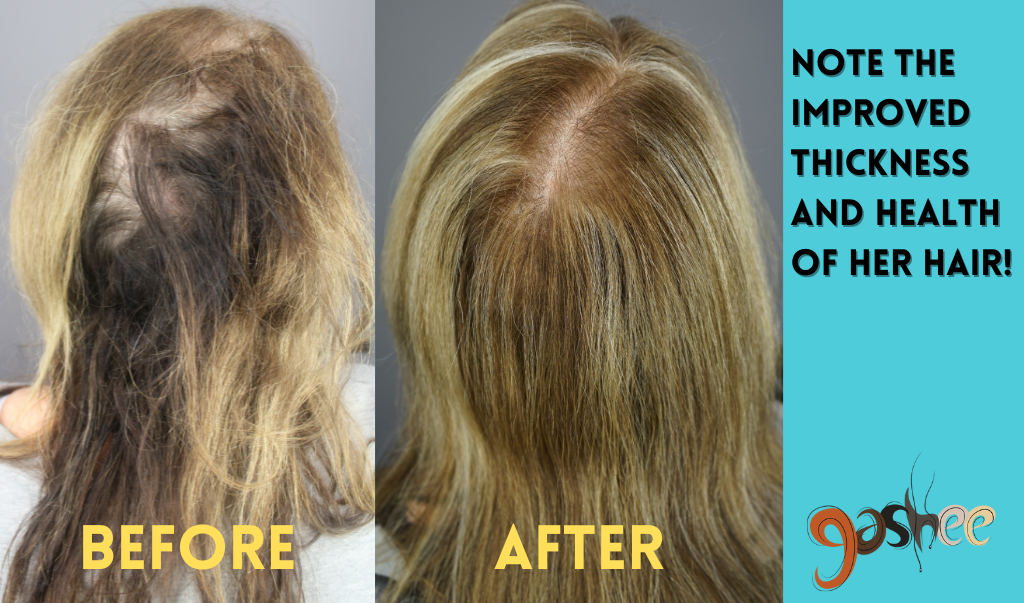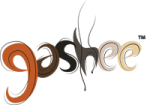Published on October 26, 2021. Last Updated on December 2, 2021.
What is Zinc: Zinc is a crucial mineral that is involved in several biological processes within your body. Zinc for hair growth and zinc for hair loss has now been studied as possible ingredient to help restore hair. As a cofactor of metalloenzyme, zinc benefits for hair are potent, as zinc is involved in almost every metabolism happening within the body, including hair growth and hair follicle cycling.
Examples of zinc metalloenzymes include DNA and RNA nucleotidyl transferases, alcohol dehydrogenase, glutamic, lactic, and malic dehydrogenase, and δ-aminolevulinic acid dehydratase16.
Zinc is also vital for maintaining homeostasis in the human body and is one of the major components of hormones, signal molecules, and enzymes. This mineral is essential for normal cellular function and has critical roles in bone formation, cell-mediated immunity, general immunological defenses, and host and tissue growth.
Zinc also provides structural integrity to enzymes, and it participates directly in catalysis.
Why Do We Need Zinc?
Zinc is a mineral that our body needs but cannot produce on its own or store. Fortunately, zinc can be found naturally in many foods and many dietary supplements.
Zinc’s Role in the Human Body
Zinc plays several essential roles in the human body ranging from:
- Maintaining proper immune system function
- Wound Healing
- Cell Division & Growth
- Protein Synthesis
- DNA Creation
- Maintaining a sense of smell and taste
- Provides structural integrity to enzymes
- Proper DNA & RNA function
- Bone formation
Benefits of Zinc for Hair Loss or Hair Growth

Zinc supplies the body as an essential mineral for the enzymatic processes involved in hair creation and hair growth.
Having too low zinc levels in the body is often associated with symptoms of hair loss or balding. Furthermore, having too high zinc levels is also associated with hair loss – therefore, a healthy balance of zinc is required for optimal hair growth.
Zinc, Hair Loss, & DHT Blocking: 1988 Study
Some experts believe that zinc also acts as a 5-alpha reductase inhibitor – a substance that blocks the effects of testosterone into dihydrotestosterone (DHT) conversion.
DHT is an androgen hormone that can bind to scalp receptors and miniaturize hair follicles, prohibiting hair growth due to smaller follicles.
DHT is the primary hormone responsible for male pattern baldness in men and female pattern hair loss in women.
In fact, most prescription hair loss medications such as finasteride work by inhibiting 5-alpha reductase from reducing DHT levels.
In this 1988 study published in the British Journal of Dermatology, researchers supported the claim that “zinc [is] a potent inhibitor of 5 alpha-reductase activity.” More so, researchers found that “at high concentrations, zinc could completely inhibit enzyme activity,” further supporting zinc’s role in stopping hair loss.
How Does Zinc Affect Hair Growth?
As stated in this 2013 study published in the Annals of Dermatology, “zinc is an essential micronutrient” that plays an essential role in the metalloenzyme process of the body. Regarding hair loss, “zinc is a potent inhibitor of hair follicle regression and accelerates hair follicle recovery.”
More so, this study goes on to state that “transient zinc deficiency is a major pathogenesis in acrodermatitis enteropathica, resulting in hair loss.”
In summary, zinc is needed for metalloenzyme processes within the body which regulate and affect hair growth and hair follicle stimulation.
Due to this fact, having enough zinc levels in your body is crucial to help alleviate the symptoms of alopecia or hair loss and is essential in maintaining and keeping healthy, dense, voluminous hair.
Zinc and Hair Loss, Hair Growth: 2013 Study
In the same 2013 study mentioned above, researchers focused on the relationship between zinc levels within the body with symptoms of hair loss or alopecia.
This study focused on 312 patients diagnosed with alopecia areata (AA), male pattern hair loss, female pattern hair loss, and telogen effluvium (TE).
The researchers found that in “all of the hair loss patients, the mean serum zinc was 84.33±22.88, significantly lower than the control group (97.94±21.05 µg/dl) (p=0.002).
From these observations, scientists gathered that there is indeed a correlation or relationship between zinc levels in the body versus healthy hair growth.
In these cases, scientists found that low levels of zinc were directly tied with low levels of hair growth on the scalp, as well as other situations of hair loss.
2013 Study on Zinc for Hair Growth: Findings
Scientists believe that zinc is a “potent dose-dependent immunomodulator of hair follicles” and that zinc is also a potent “inhibitor of hair follicle regression and accelerates hair follicle recovery.”
In summary, zinc may not be crucial to the components of the hair itself, but zinc is vital for hair growth due to the zinc metalloenzymes that are essential for stimulating the process of hair growth itself. The study states that there are “many other studies” that have also verified this correlation between “serum zinc concentration and hair loss.”
Children with Alopecia Study: Zinc Levels
More so, in another study, scientists found that “blood and urine samples of children with alopecia” had lower than recommended levels of zinc, which also strengthens the previous studies’ conclusion that healthy levels of zinc are directly tied with the healthy growth of hair on the scalp.
Therefore, to maximize the growth of hair on the scalp and hair health in general, it is recommended to take at least the minimum daily dietary requirements of zinc.
2009 Study on Zinc for Alopecia Areata
Furthermore, in a 2009 study, researchers explored the therapeutic effect of zinc supplementation in alopecia areata patients who had a low serum zinc level.
It has been reported that “some alopecia areata patients have a zinc deficiency.” Several reports have been published that state how oral zinc sulfate therapy has had some encouraging results in some alopecia areata patients.
In this study, 15 alopecia areata patients were given oral zinc supplementation to see whether or not zinc supplementation would have any beneficial therapeutic effect for alopecia areata.
50 mg of oral zinc gluconate was given to each patient daily without other treatments for 12 weeks.
At the end of the 12-week test, “positive therapeutic effects were observed for 9 out of 15 patients (66.7%) in whether or not the oral zinc supplements helped with the patients’ alopecia areata or hair loss.
Out of the 9 patients with positive therapeutic impact, “7 patients showed a marked recovery” while “2 patients showed a partial recovery.”
More so, it is essential to note that there was a “difference of the serum zinc level between the positive response group and the negative response group after the zinc supplementation. The serum zinc level of the positive response group increased by 40.9 µg/dl, and that of the negative response group increased by 7.7 µg/dl. In the positive response group, the serum zinc levels after therapy were significantly higher than those before therapy (p=0.003).”
Therefore, although all the patients were given the same amount of zinc supplementation, those who did not show significant improvement in alopecia or hair loss may have been caused by the lack of zinc absorbed within the body.
Patients whose zinc serum levels raised significantly from zinc supplementation have shown significant improvements in their alopecia or hair loss, further proving the study’s conclusion that having enough zinc in your body is an integral part of combating hair loss.
2017 Study: Zinc for Androgenetic Alopecia
In a 2017 study published in Hair Therapy & Transplantation Journal, researchers tested the safety and efficacy of zinc-thymulin (ZT) for treating androgenetic alopecia (AGA).
In this study, 18 adult subjects were recruited, 17 males and 1 female, ages 35-90 with a diagnosis of AGA, Norwood classification 2-7, and hair loss duration range of 3-40 years.
The patients were given zinc-thymulin (ZT) administered as a water-based topical spray to the scalp over 4-10 months.
At the end of the study, researchers found that zinc-thymulin (ZT) demonstrated “no adverse systemic effects or local side effects of redness or scalp irritation in any subject over a total of 3,300 treatment days.”
More so, “VAS hair assessment improvement was significant in subjects who completed 6 months of treatment (P=0.045, t-test). HGI assessment showed a significant increase in the number of newly observed intermediate hairs in previous “absent hair” regions (P<0.0001) with an average increase of vellus type (32%) and intermediate type (23%) hairs at 6 months.”
Due to the “significant increase(s)” of hair growth in previously “absent hair” regions, as well as the other reported examples of hair growth shown in this study, it can be safely concluded that topical application of ZT demonstrates possible use as a solution to treat male pattern baldness when applied for at least 6 months or longer.
Zinc & Hair Health: Study Conclusions

Due to the favorable effect zinc supplementation seems to have on these subjects, it can be concluded that having healthy levels of zinc supplementation or levels in your body could directly impact healthy hair growth for the scalp.
Recommended Sources of Dietary Zinc
There are plenty of natural or dietary sources of zinc ranging from animal sources, such as seafood, red meat, poultry, and dairy, as well as plant-based sources such as beans, nuts, fortified foods, and more. Examples of good sources of dietary zinc include:
- Red meat (unprocessed, natural red meat is most recommended)
- Beef, lamb, pork (100 grams of raw ground beef provides 44% of DV)
- Shellfish (oysters are very high in zinc – 1 medium oyster offers 48.5% of DV)
- Legumes (important to note that zinc from legumes are not as easily absorbed)
- Seeds (hemp, squash, pumpkin, and sesame seeds are high in zinc)
- Nuts (pine nuts, peanuts, cashews, almonds)
- Dairy (cheese and milk)
- Eggs
- Whole Grains (wheat, quinoa, rice, oats, zinc)
- Potatoes
- Green Beans
- Kale
- Dark Chocolate
It is important to note that although zinc is available in cereals, legumes, and other plant-based food products, plant foods also contain phytates – antioxidants that can bind with zinc and prevent your body from adequately absorbing it.
Symptoms of Zinc Deficiency
Not having enough zinc in your body could lead to several negative consequences to your health, including hair loss:
- Loss of appetite
- Delayed growth
- Poor immune health
- Hair loss
- Chronic diarrhea
- Delayed sexual maturation
- Night blindness
- Skin lesions
Daily Recommended Dosage of Zinc
As stated by Healthline, it is recommended to get at least 11 mg of zinc every day if you are an adult male and at least 8 mg of dietary zinc every day if you are an adult female.
Zinc Safety Profile
As stated by EWG, zinc scored a 3 on the EWG safety level score, which states that zinc poses no risk for cancer or developmental and reproductive toxicity. On the other hand, there is a small possible risk of allergies and immunotoxicity with zinc.
Zinc Side Effects
Zinc supplements are generally safe under normal circumstances and dosage, but zinc can also cause side effects, just like any supplement, if consumed in excess.
The tolerable upper intake level (UL) for zinc is 40 mg per day for men and women aged 19 or older. Please note that this is not the recommended dosage of zinc. If you exceed this amount of daily zinc intake over the long term, you may potentially see unwanted side effects.
Potential unwanted side effects of zinc toxicity (excessive zinc intake) include:
- Nausea
- Loss of appetite
- Diarrhea
- Abdominal cramps
- Headaches
Extreme cases of high intakes of zinc have also been associated with reduced immune function, low levels of high-density lipoproteins (HDL or “good” cholesterol), affected iron metabolism, as well as lower copper levels.
Zinc Possible Interactions
Like many other supplements, Zinc can interact with certain medications, including certain antibiotics, diuretics, and the rheumatoid arthritis medication penicillamine.
Due to these possible complications and interactions, it is always recommended to first consult with your healthcare provider before adding zinc as a dietary supplement.
Zinc Supplementation for Hair Growth: Important Facts to Consider
More so, if you are specifically looking to combat hair loss, taking extremely large doses of zinc orally can slow down hair growth by interfering with anagen development. Furthermore, excessive zinc intake can also lead to other mineral deficiencies, such as copper, magnesium, iron, and manganese, which are all important for hair growth and hair health.
It is also important to note that calcium can interfere with the absorption of zinc – it is best to avoid taking calcium supplements or calcium-high foods while you are eating foods high in zinc or using a zinc supplement.
To improve zinc absorption, it is best to take it with a meal that includes fish, shellfish, meat, or eggs.
Harness The Zinc-Infused Power of Dr.UGro All-Natural GASHEE Oral Hair Supplements
Zinc and a range of other minerals essential to hair growth are among the many powerful ingredients found in Dr.UGro Gashee Oral Hair Supplements.
Due to zinc’s complex interactions with other minerals essential to hair growth, Gashee Oral Supplements have been carefully formulated with the most effective dosage of zinc and other minerals and ingredients to help maximize zinc’s effects on your hair growth and health.
To help increase the feel and appearance of hair density, thickness, and volume, or to help regrow hair loss or aid hair growth, take 4 capsules a day.
VIDEO: Dr. UGro Gashee: Before & After Results
If you have struggled with hair loss or hair health at any point during your life, you may understand the frustrations of not being able to improve your situation, no matter what treatment, medicine, or approach that you take. Even with prescribed and over-the-counter modern medicine for hair loss, alopecia, or hair health, you may have dealt with the lack of results or improvements from these approaches to improving your hair health. Fortunately, there may be a new, natural solution available.
Meet Bernadette: Bernadette, like many others struggling and dealing with hair loss symptoms, came in for a consultation to Dr. U’s office because, for years, she has dealt with this issue of hair loss and have tried many different doctors, specialists, medications, all to no avail. Some of the hair loss symptoms that Bernadette dealt with included:
- Thinning Hair
- Growing Bald Patches of Hair
- Falling Hair
- Hair Loss
- Declining Hair Health
- Declining Hair Sheen
Through Dr.U, AKA Dr.UGRO’s recommendation, Bernadette began to use GASHEE Natural Oral Hair Supplements and Botanical Topical Lotion – with spectacular results.
In the video below, you can see the before and after transformation of Bernadette after several months of using GASHEE Hair Health Products.
Thus, after several months of utilizing GASHEE Natural Oral Supplements and Topical Lotion, Bernadette was able to rejuvenate her hair and now reports that she is “so thrilled” to “have seen results” for her hair, as shown in the video above and the before and after pictures below. More so, Bernadette says that she has “tried other [hair growth products],” but Dr.UGro GASHEE Products were the only ones that “worked” for her.
“I am completely elated with the results!”
All in all, Bernadette was wholly “elated” that she was able to enjoy her “natural, God-given hair,” filling in her hair with the natural thickness she had before.
Dr. UGro Gashee: Before & After Pictures – Hair Health Improvements Results
Dr. UGro GASHEE all-natural hair health improvement results: before and after several months of consistent usage.
Note the improved fullness, length, texture, sheen, and shine of her overall hair health.

Let Zinc-Infused GASHEE Rejuvenate Your Roots!
If you have been experiencing hair health issues such as falling hair, thinning hair, hairline recession, or other issues related to hair health, try Dr.UGRO GASHEE Products now and see how you can utilize the full power of plants, vitamins, minerals, and nature to help improve your hair health.
Related Articles on Hair Loss & Hair Health
For additional information regarding hair loss and hair health that you may find useful, visit the articles below.
References
- Kil, M., Kim, C. and Kim, S., 2021. Analysis of Serum Zinc and Copper Concentrations in Hair Loss.
- Park, H., Kim, C., Kim, S. and Park, C., 2021. The Therapeutic Effect and the Changed Serum Zinc Level after Zinc Supplementation in Alopecia Areata Patients Who Had a Low Serum Zinc Level.
- Longdom.org. 2021. [online] Available at: <https://www.longdom.org/open-access/an-analysis-of-the-safety-and-efficacy-of-topical-zincthymulin-to-treat-androgenetic-alopecia-2167-0951-1000147.pdf> [Accessed 26 October 2021].
- Plonka, P., Handjiski, B., Popik, M., Michalczyk, D. and Paus, R., 2021. Zinc as an ambivalent but potent modulator of murine hair growth in vivo- preliminary observations.
- Healthline. 2021. The 10 Best Foods That Are High in Zinc. [online] Available at: <https://www.healthline.com/nutrition/best-foods-high-in-zinc> [Accessed 25 October 2021].
- EWG. 2021. EWG Skin Deep® | What is ZINC. [online] Available at: <https://www.ewg.org/skindeep/ingredients/707056-ZINC-ZINC/> [Accessed 25 October 2021].




